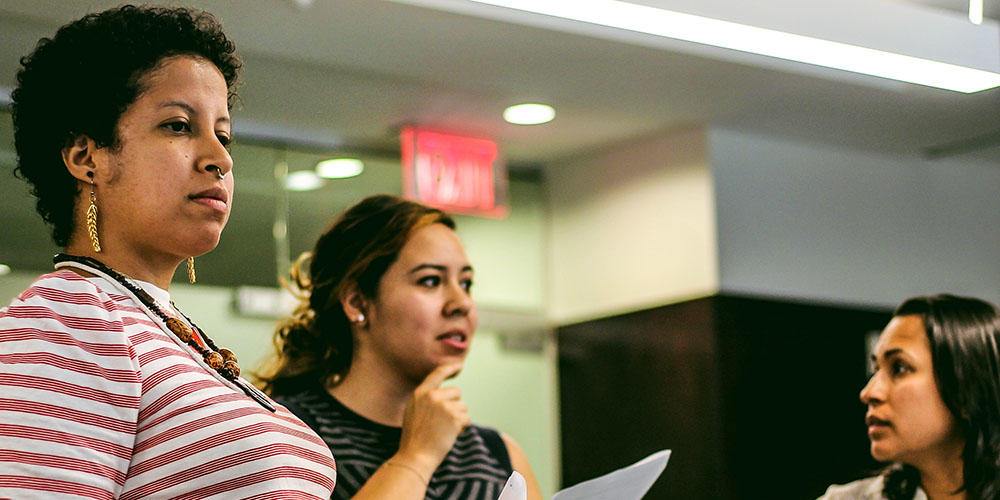
< Back to The Social Justice Fund home
General Support grant applications will be accepted only by invitation.
To have the greatest impact, organizations need flexible funding that supports organizational development and long-term planning. The purpose of the General Support Grant Program of the Social Justice Fund is to provide operating support for organizations engaged in advocacy, mobilization and healing work.
By providing general support, The Social Justice Fund will increase investment in strengthening the infrastructure for social justice work in the Pittsburgh region, particularly for efforts that are led by communities that are least well off politically, economically and socially. General support grants are one-year grants that can be renewed for up to three years. However, renewals are not guaranteed and each year the application process will be competitive. At the end of each 12-month grant period, grantees will submit a final report describing their progress and meet with Foundation staff to share their findings. Grantees will also have access to workshops, training and peer-learning opportunities to help develop their individual capacity and build networks that will deepen the collective impact of their work.
FIND OUT MORE ABOUT THE GENERAL SUPPORT PROGRAM
- What is the eligibility criteria?
To be eligible for this grant, you must be:
- A nonprofit with 501(c)3 status as determined by the IRS, or an organized collective that is fiscally sponsored by an organization that has 501(c)3 status as determined by the IRS.
- Organization must be located in, and work must primarily benefit residents of Allegheny County.
- Address social justice issues impacting residents of economically underserved neighborhoods.
Additionally, we have developed several priorities for this program. Preference will be given to those organizations or projects that:
- Demonstrate leadership by people who are most directly impacted by the issues that the organization or project is addressing. This means that they will be equitably represented in decision-making roles.
- Consider and address the disproportionate impact of social injustices (historically and currently) on people of color (Asian, Latino/a, African, Arab and Native American).
- Work at the intersection of multiple identities/oppressions (i.e., age, race, income, gender/gender identity, sexual orientation, disability, immigration status).
- Are community-based. Adapting the definition utilized by Leveraging A Network for Equity (LANE), we define a community-based organization as one that has an established history in the communities in which it works, has long-standing relationships that inform its priorities;and primarily engages and supports local residents.
- What do we fund?
The Social Justice Fund is intended to support organizations engaged in advocacy, mobilization and healing work. We have defined these categories of work as follows:
- Advocacy: Efforts intended to bring about greater justice in economically underserved, people of color, LGBTQIA, immigrant and disability communities by working to place an issue higher on the political agenda; strengthen government/institutional commitment to implement or improve policies or practices; or increase or sustain financial or other resources. This can include petitions, one-on-one educational meetings with decision-makers, raising public awareness, public education, policy analysis and litigation.
- Mobilization: Bringing together affected individuals and their allies to raise awareness of and challenge a particular social, cultural, political or economic injustice and to strengthen community participation in decision-making. Mobilization can include activities such as: community conversations, protest marches, workshops/teach-ins, using art or images to illustrate ideas or influencing public perception through traditional and popular media.
- Healing: Efforts that provide opportunities for community members to build and re-establish healthy connections and lift up resiliency and wellness practices as a transformative response to oppression, especially violence and trauma.
- What do we not fund?
- Organizations or collectives that primarily provide direct services to individuals or families.
- Statewide or national organizations, unless they have an established local office or chapter that meets the above eligibility criteria and priorities.
- Organizations or collectives that currently have an open grant with The Pittsburgh Foundation.
- Organizations or projects that expressly advocate for or endorse a specific candidate for elected office or encourage voter registration or voter turn-out for a particular party.
Questions? Please contact us:
|
|
Tika Good Program Associate goodc [at] pghfdn.org (goodc[at]pghfdn[dot]org) |


